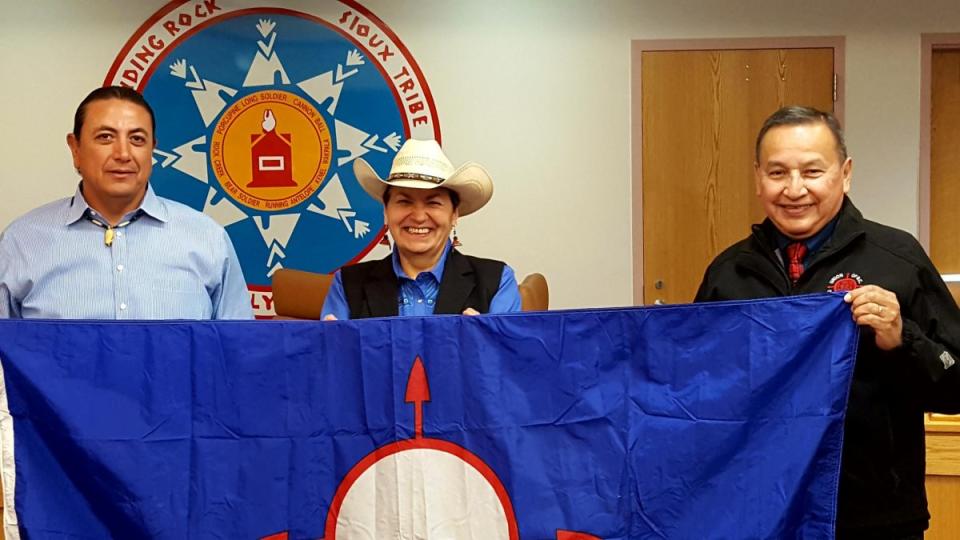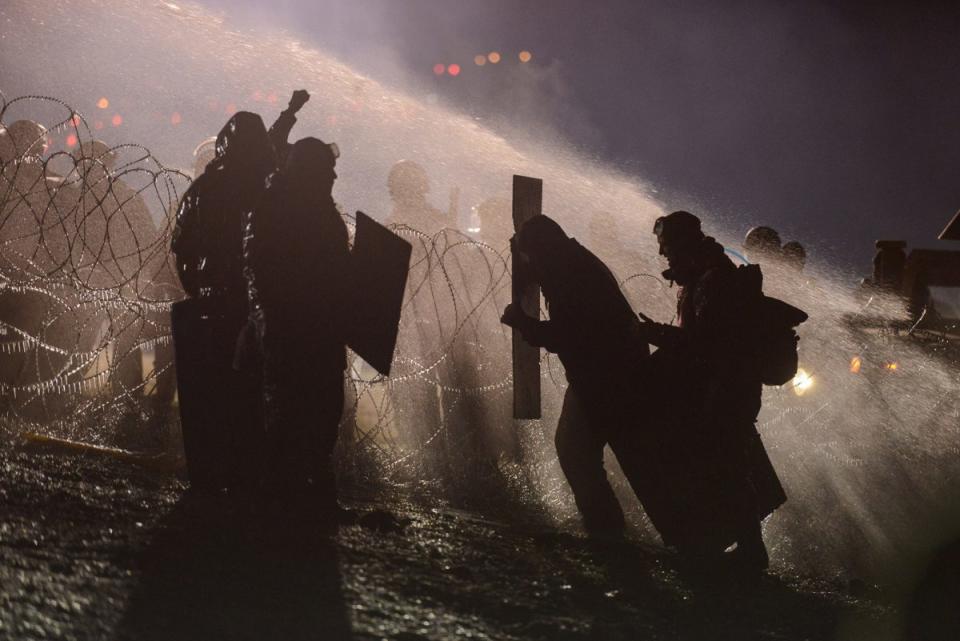Trans Mountain pipeline could get cabinet nod this week, Indigenous leader says

An Indigenous leader anticipates that a controversial domestic pipeline proposal connecting Alberta oil to the British Columbia coastline will be approved by the Trudeau government possibly as early as this week.
Grand Chief Stewart Phillip, president of the Union of B.C. Indian Chiefs, believes cabinet will approve Kinder Morgan’s Trans Mountain pipeline project on Tuesday.
The proposal would expand the existing Trans Mountain pipeline from Edmonton to Burnaby, tripling the capacity to nearly 900,000 barrels a day that would be shipped by tankers to Washington, California and Asia.
“We heard it’s going to be announced on (Nov. 22),” Phillip told Yahoo Canada News. (Natural Resources Canada reiterated in an email that a decision on Trans Mountain would be issued by Dec. 19.)
“Now the question is, what then?” Phillip said. “The battle will continue. It’s going to be a long, ugly, nasty protracted campaign and we’ll continue to fight that Kinder Morgan Trans Mountain pipeline inch by inch, yard by yard, kilometre by kilometre.”
ALSO READ: Officers douse pipeline protesters in subfreezing weather

Phillip’s remarks come after Natural Resources Minister Jim Carr told reporters last week that another pipeline, TransCanada’s proposed Keystone XL, isn’t the federal government’s sole priority to get landlocked oilsands product to market.
“It doesn’t get oil to export markets in Asia,” Carr said of the 1,897-kilometre pipeline project connecting Alberta oil to refineries in Texas.
“It’s a goal of the Government of Canada to expand its export markets.”
His comments come after Donald Trump’s election win and promise to approve Keystone XL after President Barack Obama rejected it last November.
Some politicians including ex-prime minister Stephen Harper were buoyed by Trump’s win.
Congratulations to Donald Trump on his impressive victory. Canada/US partnership is strong. There is much to do, incl moving ahead with KXL.
— Stephen Harper (@stephenharper) November 9, 2016
Mark Strahl, natural resources critic for the Conservative Party, told Yahoo Canada News “Keystone being in play is good for Canada and good for the oilsands.”
He said it will be up to TransCanada to resubmit its Keystone project for reconsideration, which the company has said it would do.
“If they do that, president-elect Trump has been clear that he’d approve it. So I think that’s good,” Strahl said. “It’s 800,000 barrels a day that should come online, which will help people working in our oilsands and in our oil sectors.”
Michael Burt, director of industrial economic trends at the Conference Board of Canada, said Keystone XL would “alleviate some of the transportation bottlenecks” in moving Alberta oil to market.
Burt — who co-authored a Conference Board report in August commissioned by the federal government to examine three different oil price scenarios over the next decade — forecasts room for two to three domestic pipeline projects even with a much more modest outlook for growth in oil production over the next five to 10 years.
Trans Mountain, Enbridge Line 3 and Energy East pipeline projects are built into that forecast.
“You’re looking at in the range of a million barrels a day of oil production increase in Canada over the next 10 years or so, and so you’re going to need at least two projects to move that much oil from Western Canada,” Burt said.
Enbridge Line 3 is a 1,096-kilometre replacement pipeline between Hardisty, Alta., and Gretna, Man., which the National Energy Board (NEB) recommends the government approve this fall, and, according to Natural Resources Canada, a cabinet decision is expected by Nov. 25.
The energy regulator has also recommended cabinet approve Trans Mountain subject to 157 conditions.
Activists and other groups say the battle will only intensify if these projects get federal approval.

Raincoast Conservation Foundation, which was an intervenor in the NEB hearings on Trans Mountain, filed a lawsuit through its counsel Ecojustice, an environmental law firm, after the regulator recommended federal approval of Trans Mountain.
“We’re continuing to pursue our legal action,” executive director Chris Genovali told Yahoo Canada News. “We’d have to look at potentially what other legal recourse there is if it’s actually approved by cabinet.”
Raincoast released a video last week showing how a potential Trans Mountain oil spill could affect the Salish Sea based on a study using drift cards as proxies for oil along the tanker route. The foundation is particularly concerned about the southern resident killer whale population and the dire consequences increased tanker traffic will have on the critically endangered species.
Chris Tollefson, who represented Nature Canada and B.C. Nature during regulatory hearings on the Northern Gateway pipeline, doesn’t expect Trans Mountain will be constructed anytime soon even with cabinet approval, saying it’ll be the subject of litigation and huge protests.
“Are they prepared to pay the political cost of approving a project that does not have the political and legal legitimacy that a project of that magnitude must have,” said Tollefson, a law professor at the University of Victoria and former executive director of the school’s Environmental Law Centre.
At least two B.C. Liberal MPs oppose Trans Mountain, including Ron McKinnon who last week wrote to the natural resources minister urging cabinet to reject the project. And it could become an election issue when B.C. voters go to the polls next spring.
“The vast majority of British Columbians that oppose these projects will not stand down particularly given the backdrop of what’s going on at Standing Rock,” said Grand Chief Phillip.
ALSO READ: Why Canadians are taking up the battle in Standing Rock against the Dakota Access pipeline
Phillip, who led part of a rally this weekend at Vancouver city hall, said he and his wife Joan drove to North Dakota in September to support members of the Standing Rock Sioux as they fight a pipeline near their reservation.
Tribal members and thousands of supporters, who have camped out in a rural area of Cannon Ball in North Dakota for months, say the Dakota Access pipeline would destroy a sacred burial ground and threaten their river water source.

Phillip, who’s worried for the future generation including that of his grandchildren, would not rule out a Canadian version of Standing Rock if Trans Mountain gets approved.
“It’s an epic battle of water versus oil. At the end of the day it’s about survival or extinction.”


